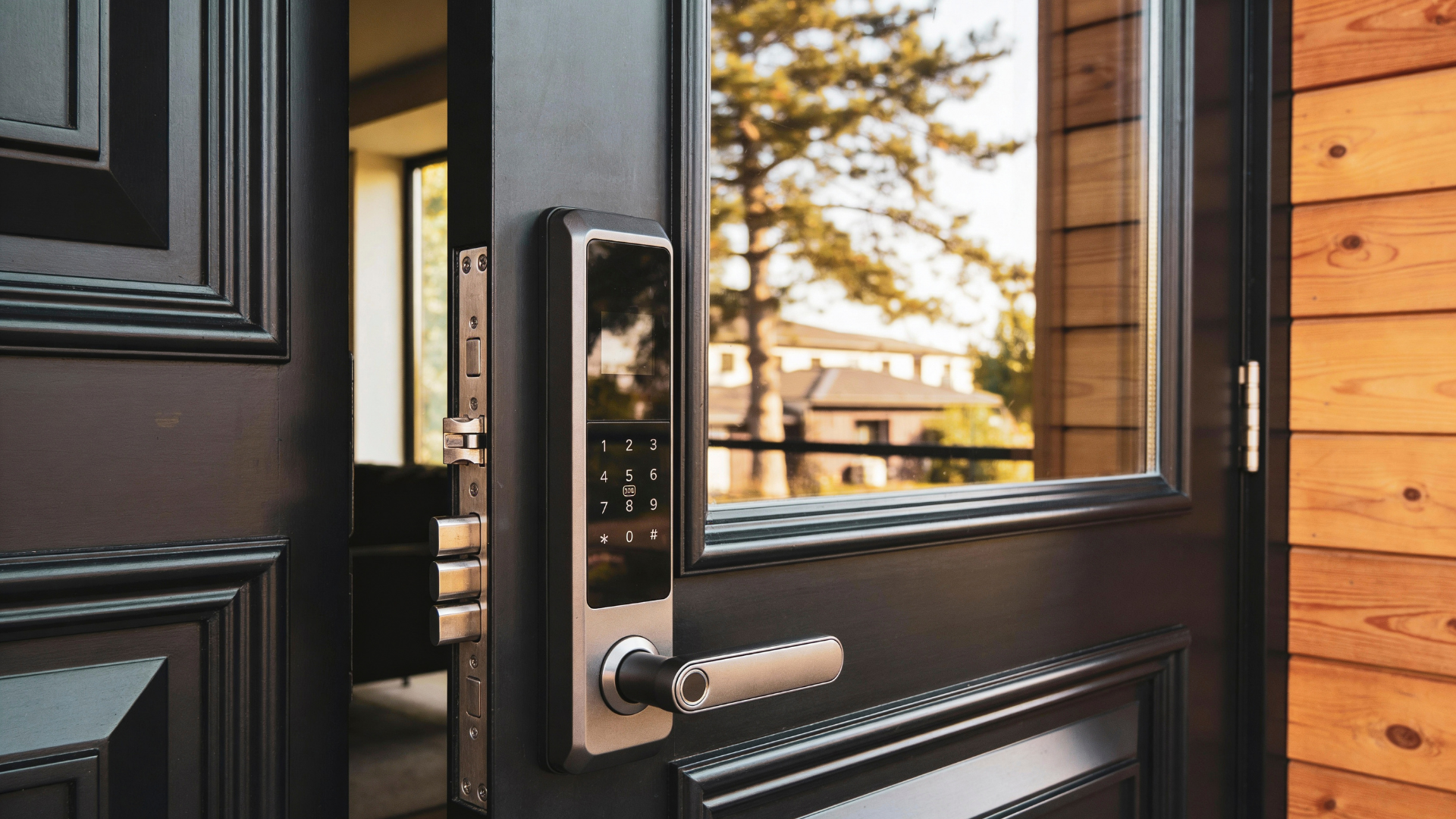Door-to-door sales are one of the ways to connect with customers on a personal level in Canada.
A door-to-door salesperson must have full knowledge about fines, rules, and marketing strategy to impress the client in one pitch.
Every province has its own specific requirements, and if you fail to follow door-to-door regulations, you will lose valuable customers.
Why Regulations Matter for Door-to-Door in Canada?
Companies put much effort into training their door-to-door salesperson, but sometimes, they are not aware of new consumer protection laws.
Missing out on new regulations can be a costly mistake, as it results in fines or complaints. This can be a major turning point as it creates low credibility and leads to the loss of potential clients for your business.
How to solve this?
This blog will break down the rules and regulations of the Consumer Protection Act, and let you understand what consumer rights are and how the CRM system helps you scale direct sales.
Quick Insights:
- Regulations are a trust point that leads you towards more customers.
- What you can sell in Alberta may be illegal in Ontario. Know the difference.
- Compliance with rules and proper contracts builds your business.
- Tools like Knockbase help you stay compliant with rules and gain loyal customers.
The Basics of Door Knocking Laws for Door-to-Door Sales
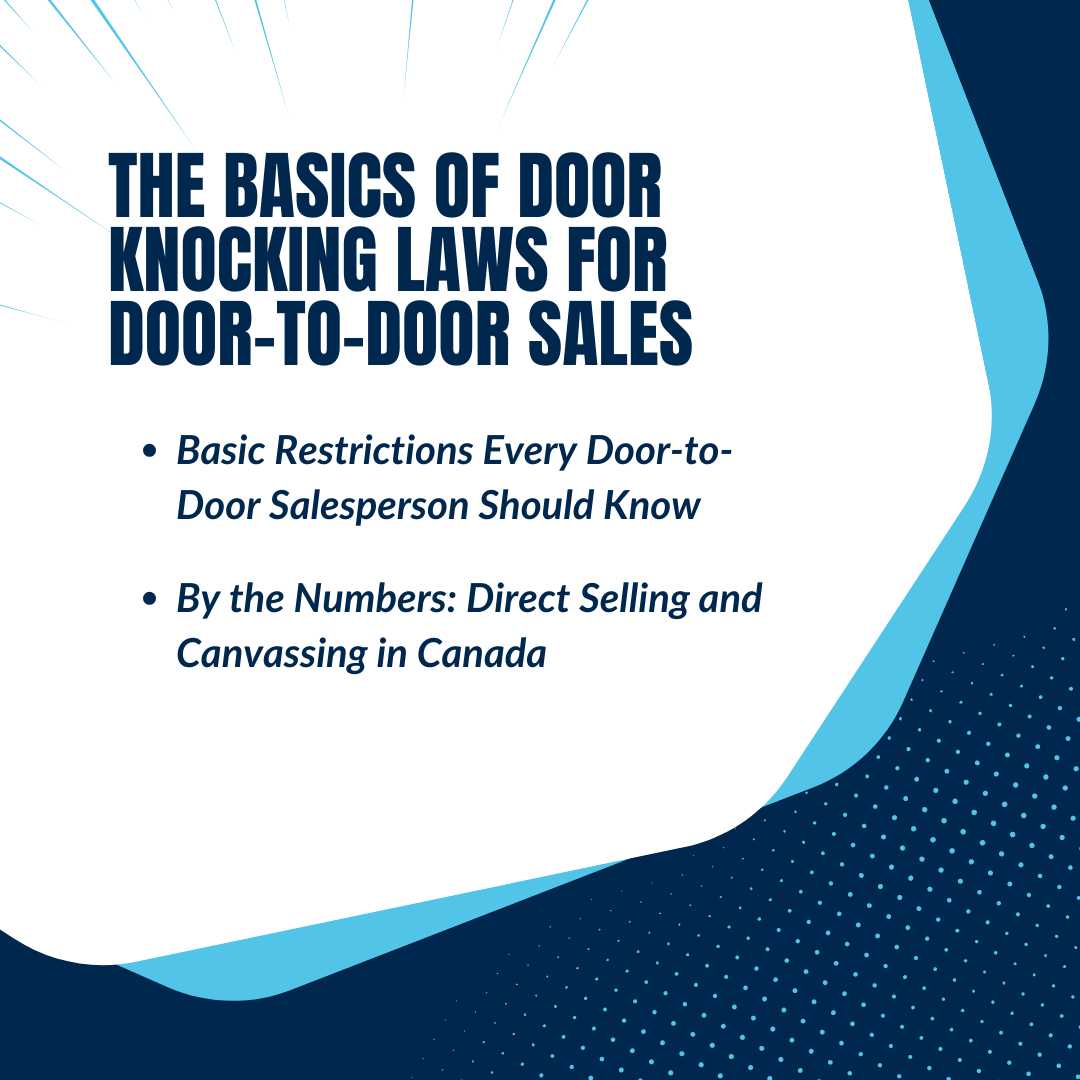
Before your door-to-door salesperson knocks on the door, he must know and understand the laws & regulations: who made the rules and why they matter.
For Canada, there is a group of laws mentioned in the Act of Consumer Protection, Ontario. Like in some specific provinces, whether the salesperson needs a license or how the buyer can initiate the cancellation is stated under such an act.
I. Basic Restrictions Every Door-to-Door Salesperson Should Know:
A. Permit For Goods Sold Door to Door:
Many provinces require a permit or a license for door-to-door sales as per the Consumer Protection Act. Without having the right to sell or permit, you cannot sell a good even if your client agrees to purchase.
B. Right to Cancellation:
It can sometimes make a person feel pressured when buying services without even thinking about the product and services, or the total price. Buyers have some days to fill out the cancellation form, in case they want to rethink their purchase and if they would like to cancel that order.
C. Canvassing Hours:
A door-to-door salesperson cannot just go and knock on doors in Canada. They have specific time limits, like sellers are not allowed to make direct sales during evenings, early mornings, and Sundays.
II. By the Numbers: Direct Selling and Canvassing in Canada
Let us check some metrics about direct selling in Canada from the IBIS world report and a study from the Grandview report:
| Metric | Value/Estimate |
|---|---|
| Independent sales consultants (2024) | 1.1–1.39 million |
| Direct selling annual revenue (2025 est.) | $5.6 billion |
| Projected revenue (2030, direct selling) | $10.0 billion |
| Industry growth rate (2023–2030) | 7% CAGR |
Door-to-Door Regulations Canada: Province-by-Province Canvassing Rules
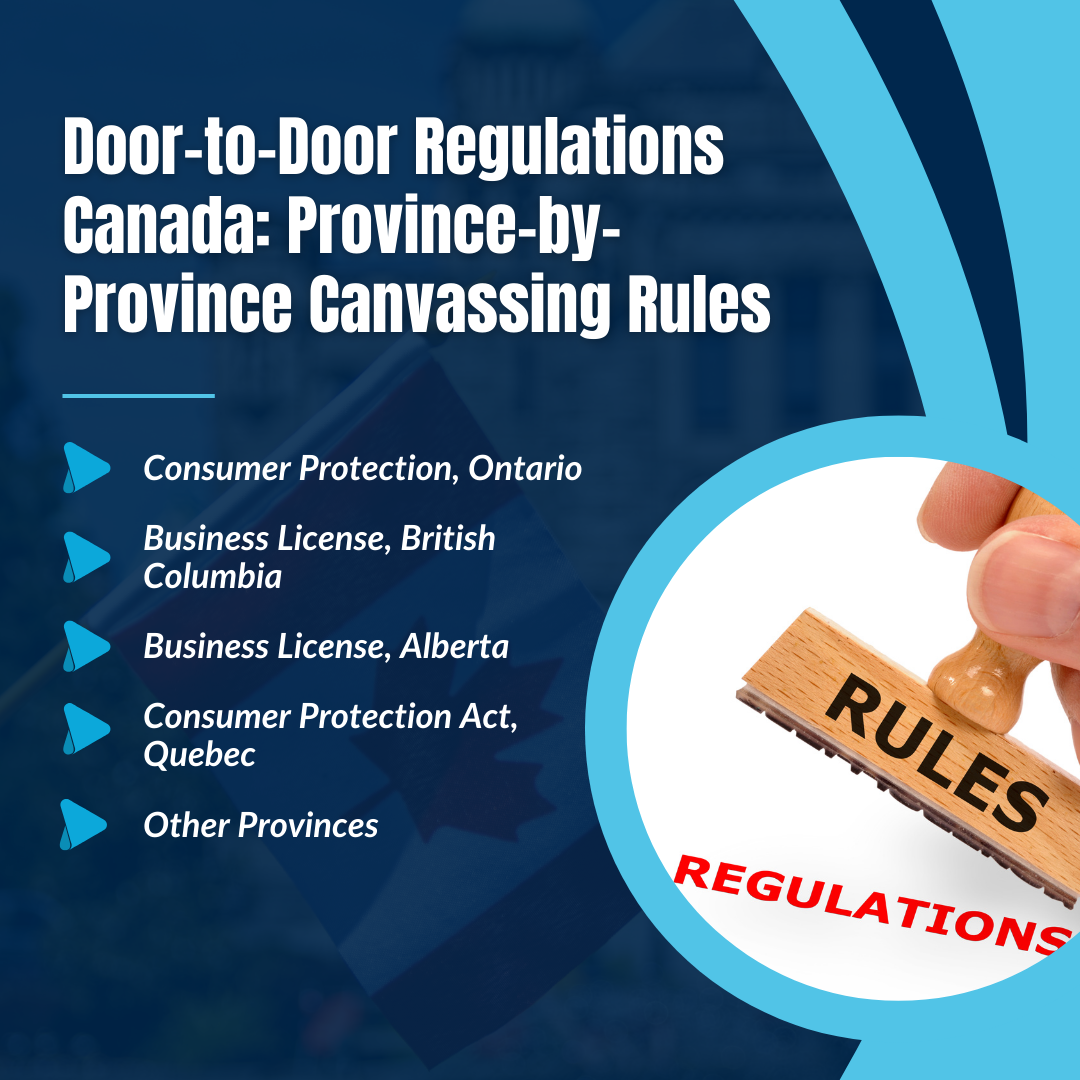
Every province has its own rules and its own way of trade in services and businesses. Let's go through certain rules applied in each province:
I. Consumer Protection, Ontario:
There is a ban on products and services like water heaters, HVAC services, and energy contracts. Such products are not sold door-to-door.
Solar, roofing, and pest control are still allowed, but rules apply to them. There is a cooling-off period of 10 days for such contracts.
For example, in the Toronto area, the rules differ. Let's check Toronto area rules:
Door-to-door salesperson need a business license before they sell their services. Also, they represent the signboards like no canvassing, and if you fail to do so, you end up with fines or complaints.
II. Business License, British Columbia:
A door salesperson requires a municipal business license or permit before knocking on doors.
Many cities have no knock-and-announce rules enforced by law.
III. Business License, Alberta:
The reps must have a direct selling business license.
Contracts must have dealing concerns or supplier information and cancellation rights.
Calgary and Edmonton have these no-knock zones, which you have to take care of.
IV. Consumer Protection Act, Quebec:
Organizations must have full disclosure and cancellation rules in their sales contract.
French language disclosure is mandatory when you have client-facing services.
V. Other Provinces:
Many municipalities have local police laws in addition to these laws. They can issue fines if any documents are missing.
Read: How to Optimize Your Canvassing Efforts in Canada
Common Restrictions to Watch For Door-to-Door Salesperson
Canada has certain firm rules, and the government is strict about compliance and mistakes. A door-to-door salesperson must know these restrictions:
1. No Knock Zones
Some areas have their no-knock zones registered or lists enrolled. Reps must do their own research.
So reps must go through such lists before knocking on the house doors or windows.
2. Restricted Products
Ontario has restricted item lists like HVAC, water heaters, and energy contracts.
Reps and Seller Companies must know what is allowed to sell and what is not.
3. Quiet Hours
There are certain limits for canvassing hours, like no late evenings, no Sundays, etc.
If your salesperson forgets that and you end up violating rules, you gonna lose your credibility and reputation for business.
4. Rules for Identity
Reps are informed to carry the company details and photo ID cards before knocking on doors.
If you forget this, you lose the client's trust in you.
Stay Legal, Sell Smarter: Best Practices for Canadian Canvassers in 2025
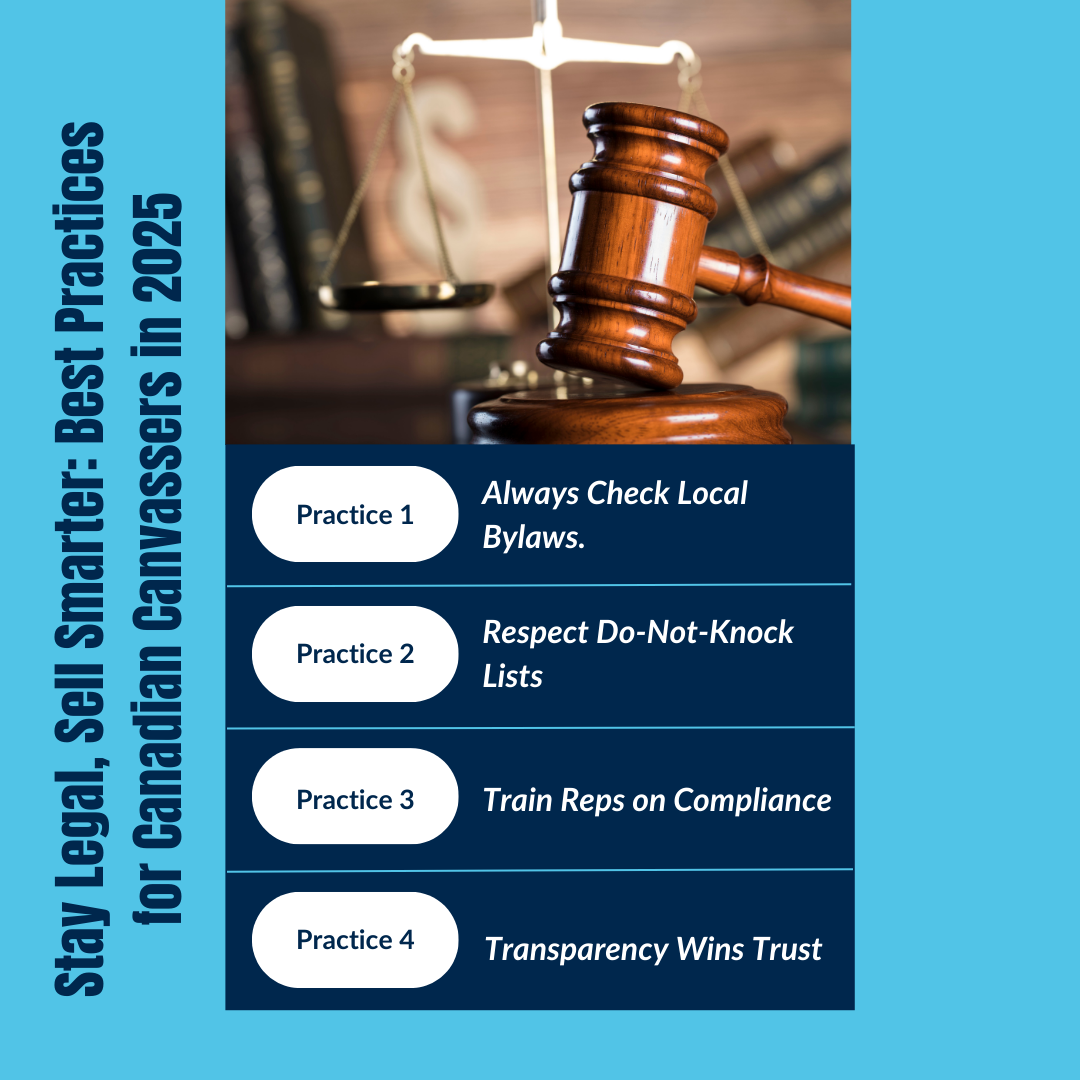
Winning deals and selling smarter is not just limited to your best pitch in 2025, but it's more about how you sell your product or services, staying compliant with rules and regulations.
Below are some best practices every canvasser should know:
Practice 1: Always Check Local Bylaws
Provincial rules act as the bottom line for canvassers, but do not forget to check the local area rules.
Local police can fine you if you make a single mistake or break a rule. Check thoroughly, as regulations are formed overnight.
Practice 2: Respect Do-Not-Knock Lists
Many areas have registries for no-knock zones. Be aware and save your pocket by avoiding the after-maintenance cost; for example, payment for rule breakers.
Dont enter the no-knock zones with your pitches; you may raise some serious concerns and consequences.
Practice 3: Train Reps on Compliance
Simple training and pitches so that your reps remember the pitch as well as the rules and regulations.
Sales Pitch must be specific about its products, like natural gas, air conditioners, home heating, or the total price, along with a do-nots and to-dos list, etc.
Practice 4: Transparency Wins Trust
Homeowners will sign contracts only when companies or suppliers have clearly mentioned money, repairs, payment terms, or cancellation forms, with complete honesty and transparency.
Transparency builds trust, and trust wins more houses and clients.
Read: How to build a Winning Door-to-Door Sales Team
How Technology Helps You Stay Compliant in 2025?
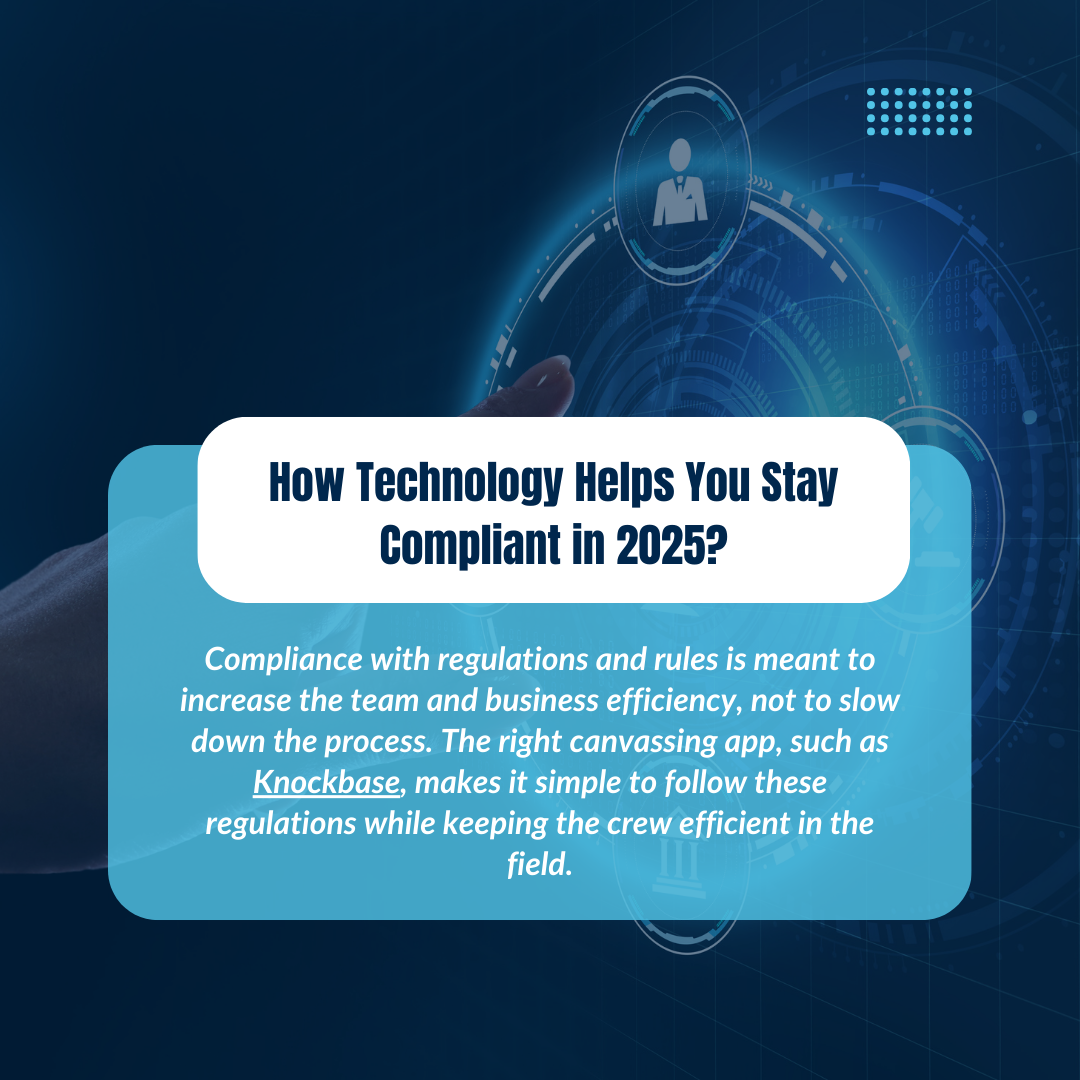
Compliance with regulations and rules is meant to increase the team and business efficiency, not to slow down the process. The right canvassing app, such as Knockbase, makes it simple to follow these regulations while keeping the crew efficient in the field.
Let's see some amazing features of Knockbase:
- Track Territories: Real-time visibility can help you track reps and territories.
- Sync with the no-knock lists: You can automatically sync on the phone with the no-knock zones.
- In-built compliance updates: This app makes you aware of new updates in the rules and regulations, so your rep knows it all.
- Stored data: You can easily track each interaction and contract in the app.
Conclusion: Smart Teams Treat Compliance as Strategy
The future of door-to-door in Canada is all about how well you stay compliant with rules and adapt the best sales pitch that easily converts the potential customer into a loyal client.
The companies that utilize technology and stay updated with the new rules, and show professionalism and respect, will scale towards the potential growth of the business. For the companies and teams that learn how to do these and log every interaction in a canvassing app using tech, they will easily gain the trust of the clients.
Ready to crack more deals while staying compliant?
Canadian rules are ever-changing, but they are never hard to understand.
Knockbase makes these complex rules and regulations simpler by automating them with other features, such as storing all data with the client from the communication stage.
Book a demo with Knockbase Today.
FAQs
Q1: Are door-to-door activities allowed in Ontario?
Yes, door-to-door sales activity can take place in Ontario; however, it is under certain regulations. Certain items cannot be sold at the door under the Ontario Consumer Protection Act.
Q2: Is door-to-door allowed in Canada?
Yes, there are door-to-door sales opportunities in Canada, but provinces (and in some instances municipalities) have their own rules and restrictions about them. All provinces (and some municipalities) want you to have a license or a permit to sell, have customer cancellation rights, etc.



